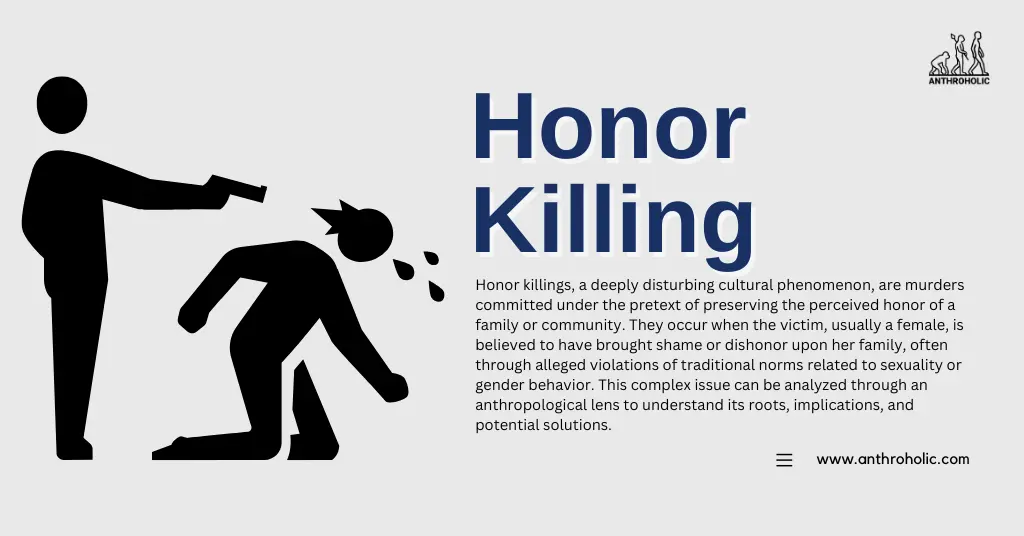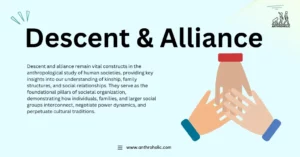Honor Killing
Honor killings, a deeply disturbing cultural phenomenon, are murders committed under the pretext of preserving the perceived honor of a family or community. They occur when the victim, usually a female, is believed to have brought shame or dishonor upon her family, often through alleged violations of traditional norms related to sexuality or gender behavior. This complex issue can be analyzed through an anthropological lens to understand its roots, implications, and potential solutions.

The Context of Honor Killings
Honor killings are deeply entwined in cultural norms, religious beliefs, and social systems of certain societies, which makes them a significant concern for anthropologists. They often happen within patriarchal systems, where family honor is intimately tied to female behavior. Some of the key reasons include [1]:
- Adultery or pre-marital sex
- Refusal to enter into an arranged marriage
- Desire to pursue an education or career
- Divorce or seeking legal separation
Geographical Prevalence
Honor killings are widespread across several regions in the world. The United Nations estimates that approximately 5,000 honor killings occur globally each year [2]. However, actual numbers could be higher due to underreporting. The phenomenon is more prevalent in parts of the Middle East, South Asia, and North Africa, but it is not limited to these areas.
| Region | Estimated annual honor killings |
|---|---|
| Middle East | 1000-1500 |
| South Asia | 1000-3000 |
| North Africa | 500-1000 |
| Other regions | 500-1000 |
Table 1: Regional breakdown of estimated honor killings [2]
Sociocultural Roots
Understanding the sociocultural roots of honor killings is critical. Anthropologists believe that such violent practices often stem from a combination of several factors:
- Patriarchy: Honor killings predominantly occur in strongly patriarchal societies where men are considered the primary authority figures, and women’s behavior is heavily monitored and controlled.
- Collectivism: In collectivist societies, individuals’ actions are seen as reflecting the honor of the entire community or family. Transgressions are considered a collective shame.
- Misinterpretation of religious texts: In some cases, religious texts are interpreted to support or condone these killings. However, most mainstream religious authorities have condemned honor killings as against the teachings of their faith [3].
- Absence of legal protection: In many regions where honor killings are common, there is a lack of legal frameworks to protect victims and prosecute perpetrators.
Consequences and Implications
Honor killings have numerous immediate and long-term implications. They result in the tragic loss of lives, reinforce gender inequality, and perpetuate cycles of violence within communities. The fear of potential honor killings also inhibits women’s empowerment and societal participation [4].
Mitigating the Phenomenon
Anthropologists argue that addressing the issue of honor killings involves both immediate and long-term strategies:
- Legal Reforms: Countries need to implement strong legal protections for victims and harsh penalties for perpetrators.
- Education: Societies should foster discussions about honor killings to challenge the cultural norms and patriarchal structures that underpin them.
- Women’s Empowerment: Empowering women through education, employment opportunities, and legal rights can challenge the patriarchal structures that support honor killings.
- Religious Interpretations: Engaging with religious leaders to discourage interpretations of religious texts that may be used to justify honor killings is crucial.
Conclusion
Honor killings are a deeply entrenched cultural phenomenon that continue to have devastating effects on societies around the world. As anthropologists, our role is to help understand the roots of this issue, expose its implications, and find ways to challenge the structures that perpetuate it. We must remember that no tradition or cultural practice can justify the taking of a human life.
References
[1] Chesler, P. (2010). Worldwide Trends in Honor Killings. Middle East Quarterly, 17(2), 3-11.
[2] United Nations. (2021). Ending Violence Against Women and Girls. UN Women.
[3] Ebrahim, F. M. (2000). Legal and Religious Response to Domestic Violence. The Muslim World, 90, 43-58.
[4] Korteweg, A. C. (2012). Understanding Honor Killing and Honor-Related Violence in the Immigration Context. Sociology of Crime, Law, and Deviance, 17, 1-23.




